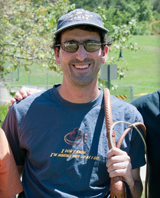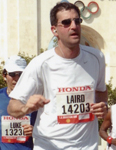
-CIA- World Factbook
-Cool Antarctica
-Discovering Antarctica
-FrankHurley.org

Laird's Bio

Follow Laird at
RunLairdRun.com

Support One of
Laird's Charities
Chapter 8 | Chapter 9 | Chapter 10

The race for the pole may seem more reasonable despite its horrible outcome for so many during the Heroic Age of Antarctic exploration. It somehow seems more natural to attempt to be the first to reach a geographic landmark than deliberately run 26.2 miles (42.2 km). Poles are meant to be reached; highest mountains climbed; longest rivers navigated; moons landed upon. 26.2 miles should be driven.
The marathon's origin is a combination of myth-creation and endurance feat. During the 1800's, any number of long distances were run. London to Portsmouth was run with stops at every pub along the way. There were 24 hour races run around tracks to see how many laps could be done (these still occur today). These races were even considered spectator sports. So, running has been in our cultures for many years. (For a great book on running, check out the recent bestseller Born to Run that combines a narrative of a 50 mile race in Mexico with the origins of our human need to run from prehistoric times.)
The first Modern Olympic Games were held in Athens, Greece. The year: 1896. Olympic founder Baron Pierre de Coubertin wanted a signature event to cap the competition. Thus entered back into human consciousness the apocryphal tale of Phidippides. During the Peloponnesian Wars, Athens was battling Persia at the Greek town of Marathon. If Marathon fell, Athens would be attacked and then sacked. However, the Greeks won the battle and Phidippides, a message runner trained to cover long distances, was sent back to bring the happy news. He ran the whole 24 miles in one go, delivered his missive and dropped dead where he stood. Or so the tale goes of Phidippides. (Search that name today and you find a ton of running stores.)
In truth, this was likely the combination of two stories. The generally accepted one is that Phidippides (or someone like him) did exist, but he actually did something much more impressive and lived to talk about it. During the aforementioned battle, with Athens losing, he was sent over 200 miles to rival Sparta to ask for help. He covered the distance (which is run today as the Spartathalon) in just a few days. Sparta promptly said "no" and he ran back to the battle to report the news. Athens did win anyway, and likely another runner was sent to Athens with the winning news (and did not die). This is all 2400 years ago, so details are sketchy.
Still, running from Marathon to Athens sounds better and could be done in less than 3 hours which would be a great climax to the newly formed Olympic Games (the ancient Olympics never had running distances over a few miles). Thus the modern marathon was born. The first winner was a Greek which helped propel national fervor, and a group of Bostonians at the Olympics were so impressed, they went home and started the Boston Marathon the next year and have basically run it over the same route every year since. In fact, every major, and many minor, cities in the world have a marathon.
DID YOU KNOW?? The official marathon distance of 26.2 miles was first run at the 1908 Olympics -the distance between Windsor Castle and the Olympic Stadium in London. Although the 1896, 1900, 1904, 1908 and 1912 Olympics all used different distances, the 1920 games in Antwerp adopted the 26.2 length from London and any marathon run today is exactly that distance.
The marathon quickly became a mark of extreme fitness. Women were barred for many years for fear they would die if they ran that far. Of course, that was hogwash and more a result of attempting to defend squashing the various woman suffrage movements of the time asking for the vote for the fairer sex. Woman needed to be protected according to the dying Victorian Aged men of the day. Then, in the 1970's, running took off as a form of personal recreation. The NYC Marathon started in the early 1970's and other big marathons followed suit. Completing a marathon became the ultimate expression of doing something outstanding.
When I look around the boat at someone like Les (also using an iPad), he's in his 50's, looks great and is on his 20th marathon. Bob from San Diego is doing his 17th at age 74 in support of a charity. He started running at 63 in memory of his brother who died of cancer. He will complete his 7 continents on this trip and hit a secondary goal of 25,000 miles run (races and training) by the end of the year. This is the circumference of the earth, so he will have run around the planet in two ways. (I have run about 7,000 miles in 5 years.) Michael at 75 is the oldest on the trip and will be the oldest ever to run a marathon in Antarctica. Martin, who I first met in Casablanca in October, will finish his 7th continent too. He started a few years ago after having double disk back surgery. Told he shouldn't run, he nonetheless set a goal of all 7 continents and the big 5 marathons (Boston, Chicago, New York, London and Berlin) before he was 40. Antarctica will be his 7th continent. He runs Boston in April and hits the decade mark in September, a few weeks after he runs in Berlin - the last of the big 5. What will any of these people do next? Well, 2 people on the trip are running their 2nd Antarctica race. Geoff from Wellington, New Zealand is doing his 3rd Antarctica run and will also complete his 3rd seven continent set. Like Les, all of these people look healthy. I'll leave my thoughts on my own future quests for a later chapter.
Read about the 2,500th anniversary of the marathon at Runner's World.
Back to the Top
Chapter 8 | Chapter 9 | Chapter 10



